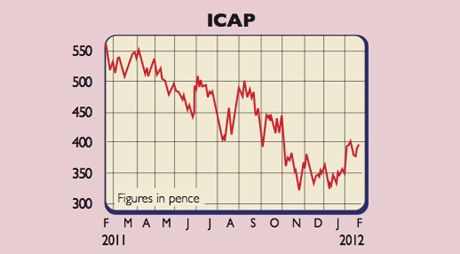Get the latest financial news, insights and expert analysis from our award-winning MoneyWeek team, to help you understand what really matters when it comes to your finances.
You are now subscribed
Your newsletter sign-up was successful
Want to add more newsletters?

Twice daily
MoneyWeek
Get the latest financial news, insights and expert analysis from our award-winning MoneyWeek team, to help you understand what really matters when it comes to your finances.

Four times a week
Look After My Bills
Sign up to our free money-saving newsletter, filled with the latest news and expert advice to help you find the best tips and deals for managing your bills. Start saving today!
Volatility is good news for the world's largest inter-dealer broker, ICAP, which helps clients organise and process over-the-counter (OTC) derivative trades. These involve taking positions on interest rates (41% of sales), foreign currencies (20%), commodities (11%), credit (9%), equities (9%) and emerging markets (10%).
So why have shares in the company fallen 20% since September? Eurozone concerns, bank lending and credit derivative markets drying up in the fourth quarter of 2011 provide the answer. All this came on top of regulation-inspired sales of risky assets and clients closing out derivative positions early before Christmas. These factors hit transaction volumes, especially in ICAP's voice division (44% of profits).
But the company's performance picked up in January thanks to some bold moves to increase liquidity from central banks (including the Fed's new dollar swap lines). This has rejuvenated trading and led the chief executive, Michael Spencer, to declare in February that earnings would be "towards the top end of expectations".
MoneyWeek
Subscribe to MoneyWeek today and get your first six magazine issues absolutely FREE

Sign up to Money Morning
Don't miss the latest investment and personal finances news, market analysis, plus money-saving tips with our free twice-daily newsletter
Don't miss the latest investment and personal finances news, market analysis, plus money-saving tips with our free twice-daily newsletter
Cost savings to the tune of £20m and growth opportunities overseas have also helped. Spencer approves of Chancellor George Osborne's bid to make London the centre for international dealing in the Chinese renminbi. Another boost could also come from the recent lifting of a temporary short-selling ban on French banks (so investors can now bet on prices falling as well as rising).
ICAP (LSE: IAP), rated a BUY by Singer Capital

The City expects turnover and underlying earnings per share (EPS) of £1.7bn and 37.2p respectively for the year ending in March, along with a 5.2% dividend yield (1.8 times covered by profits). I value the group on a ten-times earnings before interest, tax and amortisation (EBITA) multiple. Adjusting for net debt of £213m (representing 0.6 times EBITA) delivers an intrinsic worth of more than 500p a share.
There are a few pitfalls to consider. Lehman Brothers' collapse prompted governments to tighten regulation in the OTC market. So we might see a chunk of ICAP's operations transferring on to recognised exchanges. There are also fears that Europe's proposed Tobin tax may reduce volumes. ICAP is also exposed to counter-party risk.
That said, its IT platforms, iSwap and BrokerTec, should meet most, if not all, future statutory requirements. And its derivative margining systems should mitigate the impact of any customer defaults. Broker Singer Capital has a 475p price target with preliminary results set for mid-May.
Rating: BUY at 395p
Paul Hill also writes a weekly share-tipping newsletter, Precision Guided Investments. See Moneyweek.com/PGI , or phone 020-7633 3634.
Get the latest financial news, insights and expert analysis from our award-winning MoneyWeek team, to help you understand what really matters when it comes to your finances.
Paul gained a degree in electrical engineering and went on to qualify as a chartered management accountant. He has extensive corporate finance and investment experience and is a member of the Securities Institute.
Over the past 16 years Paul has held top-level financial management and M&A roles for blue-chip companies such as O2, GKN and Unilever. He is now director of his own capital investment and consultancy firm, PMH Capital Limited.
Paul is an expert at analysing companies in new, fast-growing markets, and is an extremely shrewd stock-picker.
-
 Should you buy an active ETF?
Should you buy an active ETF?ETFs are often mischaracterised as passive products, but they can be a convenient way to add active management to your portfolio
-
 Power up your pension before 5 April – easy ways to save before the tax year end
Power up your pension before 5 April – easy ways to save before the tax year endWith the end of the tax year looming, pension savers currently have a window to review and maximise what’s going into their retirement funds – we look at how